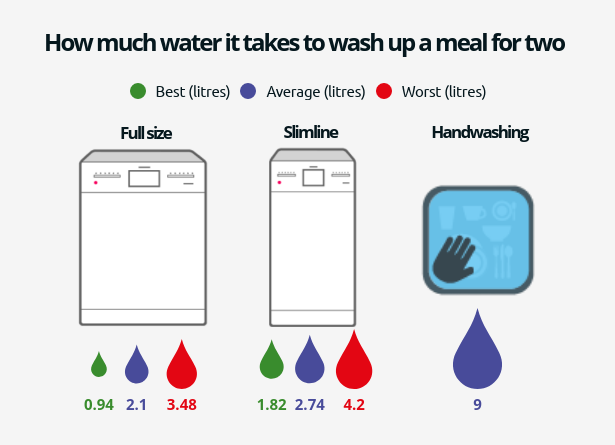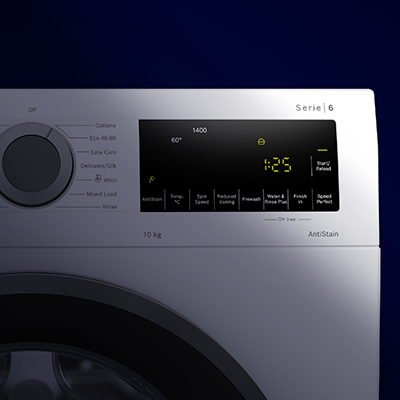
Five Ways to Reduce Your Energy Bills this Summer
With energy bills set to increase this summer and again in the autumn, we know many of our customers are concerned about how they will reduce their energy use. While we can’t reduce the cost of the energy you use (sorry about that!) we CAN help you to make small changes that will reduce your bills by a few pounds per week.
1. Dishwashers use less water than washing by hand
First off, let’s start with a dishwasher - an appliance relied upon in kitchens the world over. Many people worry that running their dishwasher uses too much electricity as well as a large volume of water, however, the truth is quite different. Using a dishwasher consumes less water than washing by hand.
Using the eco cycle on your dishwasher is also a must. While many of us reach for the quick cycle, (thinking faster means less energy used) heating up water quickly uses more energy. Running a slightly longer eco cycle uses less energy, therefore reducing the cost of getting your dishes sparkly clean.

1. Dishwashers use less water than washing by hand
First off, let’s start with a dishwasher - an appliance relied upon in kitchens the world over. Many people worry that running their dishwasher uses too much electricity as well as a large volume of water, however, the truth is quite different. Using a dishwasher consumes less water than washing by hand.
Using the eco cycle on your dishwasher is also a must. While many of us reach for the quick cycle, (thinking faster means less energy used) heating up water quickly uses more energy. Running a slightly longer eco cycle uses less energy, therefore reducing the cost of getting your dishes sparkly clean.


2. Turn off devices at the wall
If, like most of the families in the UK, you have phone chargers, gaming consoles, appliances and TVs all plugged in, switching them off at the plug could save you more than you realise. We spoke to one couple who had managed to save 70p per day on their electricity bill, simply by turning off all their appliances at the plug before going to bed each night. Using their smart meter, they recorded what they usually spent overnight on electricity, for one week they did an experiment and turned off all their plugs at the wall - the results were astounding. When they came down in the morning they noticed they had used 70p less electricity overnight just by turning off all appliances at the wall.
We did the maths and realised that if this saving remained constant, they would save a whopping £255 per year.
While we can’t guarantee how much energy your plugs being left on costs you, we do know that they will be using electricity, albeit a small amount.

2. Turn off devices at the wall
If, like most of the families in the UK, you have phone chargers, gaming consoles, appliances and TVs all plugged in, switching them off at the plug could save you more than you realise. We spoke to one couple who had managed to save 70p per day on their electricity bill, simply by turning off all their appliances at the plug before going to bed each night. Using their smart meter, they recorded what they usually spent overnight on electricity, for one week they did an experiment and turned off all their plugs at the wall - the results were astounding. When they came down in the morning they noticed they had used 70p less electricity overnight just by turning off all appliances at the wall.
We did the maths and realised that if this saving remained constant, they would save a whopping £255 per year.
While we can’t guarantee how much energy your plugs being left on costs you, we do know that they will be using electricity, albeit a small amount.
3. Switch to LED light bulbs
If your home has light fittings with multiple bulbs, under pelmet lights, spotlights, and hall lights that get left on for long periods of time, the number of lightbulbs in your home could be more than you think. Switching to LED light bulbs will reduce the amount of electricity you use in one simple step.
LEDs use up to 90% less energy and last up to 25 times longer than traditional incandescent bulbs.4. Run your appliances after 10pm
It’s worth checking your energy tariff, as some have cheaper rates at night, if you’re on one of these tariffs you could save money by simply waiting to run your washing machine and dishwasher overnight. Electricity typically costs less when fewer people use it. So, check your tariff, and wait to switch your appliances on until you go to bed.

3. Switch to LED light bulbs
If your home has light fittings with multiple bulbs, under pelmet lights, spotlights, and hall lights that get left on for long periods of time, the number of lightbulbs in your home could be more than you think. Switching to LED light bulbs will reduce the amount of electricity you use in one simple step.
LEDs use up to 90% less energy and last up to 25 times longer than traditional incandescent bulbs.4. Run your appliances after 10pm
It’s worth checking your energy tariff, as some have cheaper rates at night, if you’re on one of these tariffs you could save money by simply waiting to run your washing machine and dishwasher overnight. Electricity typically costs less when fewer people use it. So, check your tariff, and wait to switch your appliances on until you go to bed.

5. Use a heat pump dryer
In the summer months we use our dryers less, but if you are considering buying a new dryer, choosing a condenser is a great option when trying to reduce your bills. Condenser dryers may seem like they take longer to dry the clothes, (which they often do) but their heat pump technology makes them more energy efficient. During the drying cycle, they use inbuilt heat pump technology, meaning warm air is recirculated for re-use - making them more efficient.
We all love to dry our clothes outdoors, but when the British weather fails - make sure your dryer is an energy-efficient model.
5. Use a heat pump dryer
In the summer months we use our dryers less, but if you are considering buying a new dryer, choosing a condenser is a great option when trying to reduce your bills. Condenser dryers may seem like they take longer to dry the clothes, (which they often do) but their heat pump technology makes them more energy efficient. During the drying cycle, they use inbuilt heat pump technology, meaning warm air is recirculated for re-use - making them more efficient.
We all love to dry our clothes outdoors, but when the British weather fails - make sure your dryer is an energy-efficient model.

